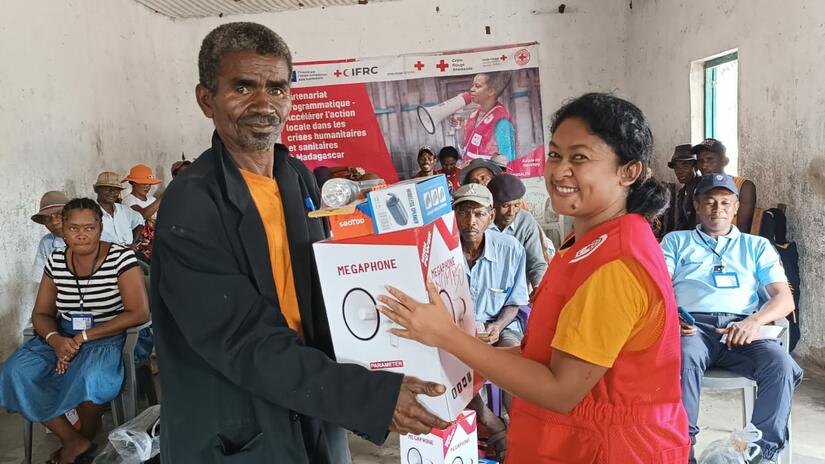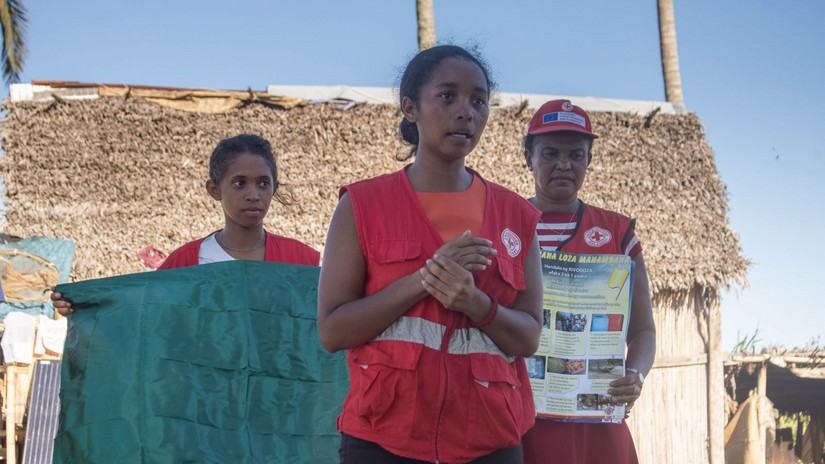At just 23 years old, Valisoa Liesse Razafisalama is already making a significant impact as a third-year communication student at the Madagascar’s National Tele-Education Center and a dedicated volunteer with the Malagasy Red Cross.
Through her involvement in the National Disaster Response Team (NDRT), Valisoa has gained valuable experience raising awareness and providing training following recent tropical storms.
However, it has been her initiative to challenge societal norms surrounding menstruation that truly showcased her dedication to breaking down barriers.
“As members of the Red Cross movement, active in the humanitarian sector, we advocate for greater recognition of the role of women,” says Valisoa, who is among the roughly 42 percent of Malagasy Red Cross NDRT staff who are women.
“We encourage the equitable inclusion of women in community decision-making, breaking with the trend of prioritizing men. We persist in our efforts because as women volunteers, we make significant contributions to the well-being of the communities where we operate.”
Not just a women’s issue
Valisoa observed a prevailing trend where men in her community showed disinterest in discussions about menstruation, viewing it solely as a women's issue. Determined to change this perspective, she organised awareness sessions for both men and women, emphasising the natural and normal aspects of menstruation.
By fostering a shared understanding within the community, Valisoa contributed to eliminating the stigmas associated with menstruation and promoting gender equality. In many post disaster situations, fear of talking about menstruation or other health issues can mean that women simply do not get full attention and care they need to stay healthy.

33-year-old Lova Arsène Linà Ravelohasindrazana, project manager for the Malagasy Red Cross, provides early warning equipment to community members impacted by tropical storms.
Photo: Malagasy Red Cross Society
Challenging cultural stereotypes
With a background in biodiversity and the environment, and extensive experience in humanitarian work, 33-year-old Lova Arsène Linà Ravelohasindrazana exemplifies resilience and determination in challenging gender stereotypes.
Working as a project manager for the Malagasy Red Cross, Lova oversees interventions in the Anosy region, were cultural barriers often hinder women's participation in leadership roles.
Despite facing resistance, Lova actively promotes women's empowerment, ensuring their involvement in decision-making and community initiatives. Seven percent of decision makers on the National Society’s management team are women and Lova is among them.
"During interventions, whether it's in the communities or among the people I supervise, the culture still makes it difficult for them to accept women that lead,” she says. “As a project manager, there are times when I can feel it most.
“But I also try to understand how these communities in which I work function. How I can make them more aware of what I and others can bring, how to better approach things and what are the approaches to avoid offending people's sensitivities in relation to their culture.”
Lova's dedication to advocating for women's rights extends beyond her professional life. She also educates women about their rights and encourages their active participation in various initiatives, contributing to a more equitable society.

